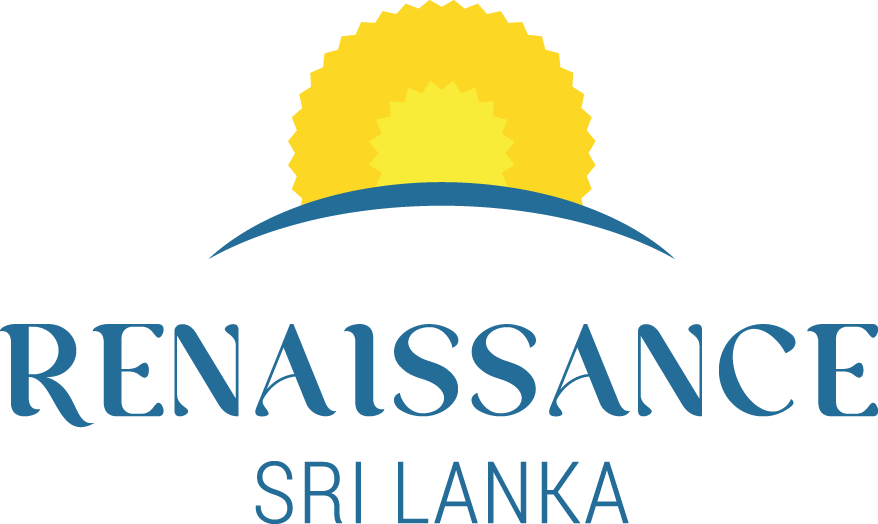
The Proud Journey of Renaissance Sri Lanka: Discover our numerous Achievements and Milestones
Renaissance Sri Lanka is an international non-government-operated organization. It was founded in France on the 31st of December 2020. The main aim is to enable whole villages in Sri Lanka to be self-sufficient and sustainable in key areas of life, such as food, goods, services, and socio-cultural activities.
History and Origins
Background
Sri Lanka is a developing island country in the Indian Ocean. As of 2022 the country’s population stands at circa 22 million and is an eclectic mix of cultures, languages, religions, and ethnicities. The country’s history of migration, colonization, and locality on major trade routes dates back over 3000 years.
Following the collapse of the economy, the nation is currently trapped in a severe economic and socio-political crisis following the collapse of the existing market system. This was compounded by the COVID pandemic, the Express Pearl disaster, the Easter Bombings and trade mis invoicing. With heavy dependency on imported goods impacting on its agricultural production, the country has increasingly become less self-sufficient, further contributing to the downward spiral into severe debt.
Foundation
Renaissance Sri Lanka [RSL] was founded towards the end of 2020 during the height of the COVID pandemic by the two visionary founders: Ashinsa Bopearachchi and Neville Weerasinghe. They guide the organization in line with its mission and objectives, which are influenced by the current political and socio-economic crisis. Having met during the Sri Lankan Civil War Period, they designed and set up their joint enterprise, naming it ‘Renaissance Sri Lanka’ [French definition of Re-birth] with a vision of, a marvelous spring rebirth of Sri Lanka.
Structure
The organization is run by Sri Lankans and Sri Lanka enthusiasts, comprising of roughly 45 volunteers and freelancers.
Ms. Bopearachchi, a Sri Lankan currently residing in France is the Chairperson and Executive Director of RSL. She brings over twenty years’ experience as a program manager in the IT field including her considerable experience in the non-profit sector including managing a non-profit organization for cultural exchange and learning called Brain Tea. She holds an Executive MBA, a Master’s degree in Computer Science as well as a Master’s degree in Applied Physics.
The Global coordinator of the humanitarian work in Sri Lanka is Mr. Weerasinghe a Sri Lankan journalist living and working in Sri Lanka. He has over twenty years of experience coordinating large humanitarian projects in Sri Lanka, including island-wide peace building initiatives during the Sri Lankan Civil War (1983-2009).
The organisation utilizes the Scaled Agile Framework (SAFe) for complex program management and apply the concept of ‘Business agility’ into their model. This allows the whole organisation including volunteers to have a voice, while enabling the model to innovate and adapt to latest research and studies from both Sri Lanka and abroad.
Fundamental Principles
The ethos behind RSL is to support the Sri Lankan population by implementing ethical change and improving the overall livelihood of the population whilst maintaining the country’s cultural identity and social values.
Based on the ideology of a Village ecosystem, RSL plans to cultivate a self-sufficient community despite the country’s weak economy. By using local resources, the community would rely on agro ecological practices and rely on fewer imported goods.
The objective is to build sustainable community ecosystems in small geographical areas in partnership with the local communities and investors to create a holistic approach to reach a balance between the three key components of economic, environmental and social ecosystems.
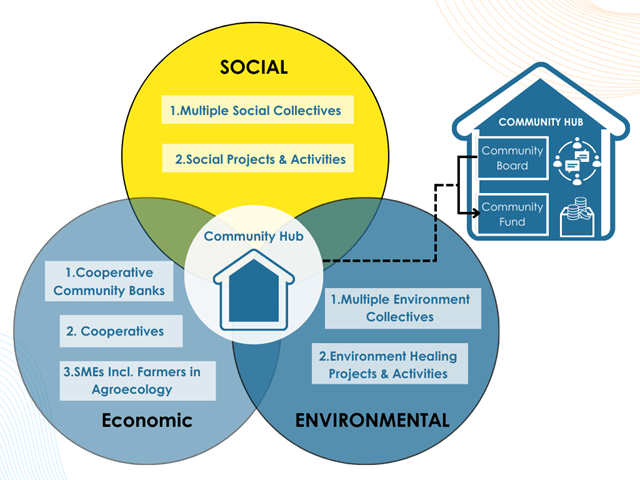
A simplified representation of a community ecosystem structure. © Renaissance Sri Lanka
This approach is further bolstered by embracing 15 out of the 17 goals as embraced by the UN for sustainable development.
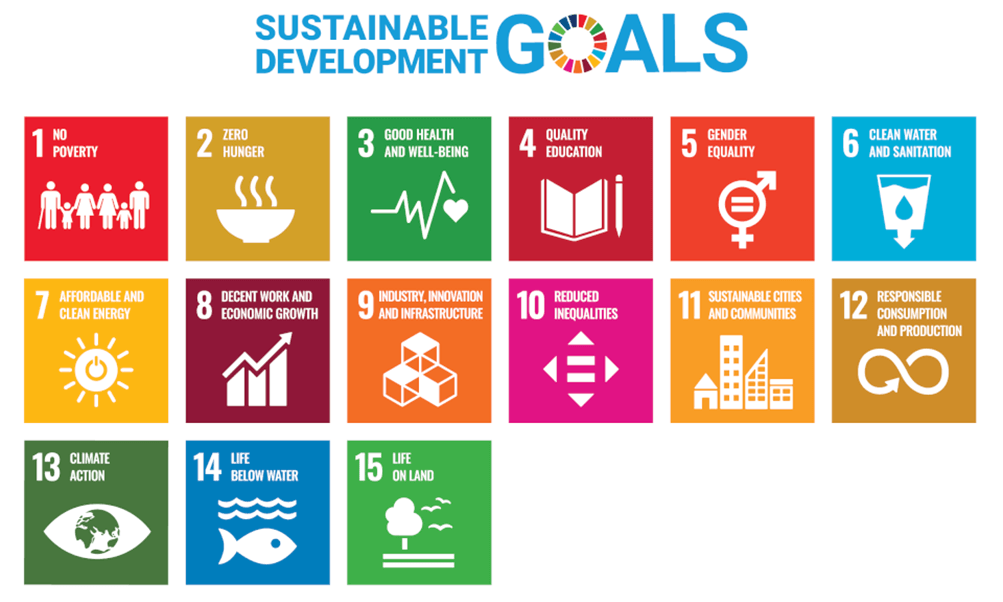
The 15 sustainable development goals Renaissance Sri Lanka works for
The community ecosystem
The community ecosystem model is a solution for a sustainable development for Sri Lanka, that lies in the creation of a new model of collective economic, social, and cultural system, based in rurality. The model offers benefits that state governance and market system cannot or has not offered as yet.
At the heart of this model are the collective projects, investments, and production by the rural community for itself, favoring the circulation of money from the village within the village, promoting a thriving environment, and creating culturally advanced people.
The community center made up of a community board and a community fund, composes the basic structure needed to start the building of a community eco system.
Projects
Project 1000: Building self-sustaining communities
Sri Lanka’s heavy reliance on imported products for even the most basic needs, including its agricultural production, has raised the importance of becoming more self-sufficient. The demonstrations in the Spring and Summer of 2022 have shown that the people of Sri Lanka are capable of uniting regardless of community, religion or class to collectively participate in the reconstruction of the country.
Mannar District is part of the Northern Province and is one of 25 Districts of Sri Lanka. Situated in the Northwest, it encompassed the mainland and the island of Mannar which is situated in the Gulf of Mannar. The total land area is 2,002 km2 with 1,220 km2 of forest cover. According to the 2020 census, Mannar district is composed of 163, 096 individuals with about 48% male and 52% female. 75% of the population lives in rural areas. Mannar District is a multi-ethnic, multi-cultural and multi-religious region with a large majority of Christians (58%), followed by Hindus (24.1%), Muslims (14.5%) and Buddhists (1.6%). The population is composed of Tamils (81.1%), Sri Lankan Moors (16.5%) and Sinhalese (2%).
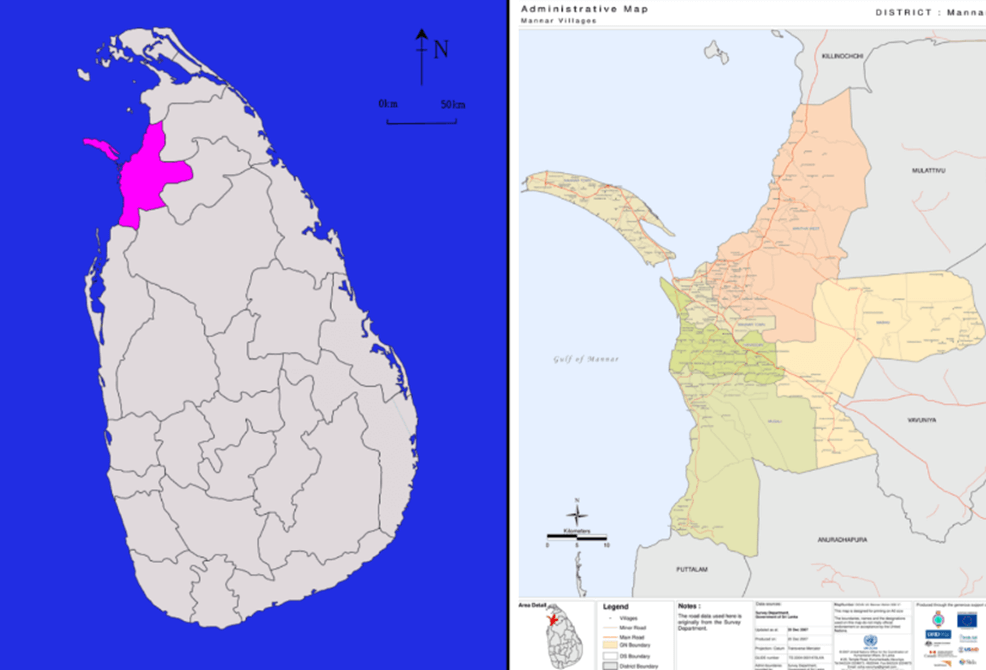
Mannar District Maps © Wikimedia Commons Treganrasu, 2007 United Nations Office for the Coordination of Humanitarian Affairs, Sri Lanka
According to Sri Lanka’s National Multidimensional Poverty Index (NMPI), nearly 30% of the population of Mannar lives in poverty and is the fifth poorest district of Sri Lanka.
In the Mannar district, RSL will be implementing economic, social and environmental projects to address the most pressing issues facing village communities and to prepare them for the challenges of the future.
From the ground up, RSL will be collaborating with the village members to establish a governing body and a community fund that are used to finance and administer the projects. Collectives and cooperatives form the backbone of each such community ecosystem.
The Main Social Projects conducted to build a Community Ecosystem
- Create a community library to improve access to education and knowledge.
- Teach filmmaking and organize screenings of locally produced films in cultural centers.
- Create and partner with existing social collectives to empower community members to take action and solve problems themselves.
- Create a cooperative store for the sale of all products from local farmers and SMEs.
- Create a donation space where community members can give away what they don’t need and freely take what they need from what is available.
RSL plans to replicate this model across the country for a national impact to secure a future for Sri Lanka. This project is currently in the fundraising stage.
See article in link for further details.
Project 100: Dry Food
Directly linked to Project 350, this project addresses the food sovereignty issue in Sri Lanka, along with achieving gender parity in the food industry by enabling women to run their own dry food businesses.
RSL funded and trained women from vulnerable communities in the Badulla district how to process, dry, and package organic garden produce in a cooperative system, for sale in the local and Sri Lankan markets.
The theoretical and practical training and guidance have been given to two groups of ten women over a period of three months.
Two food drying machines powered by solar energy are purchased to be shared by the home in a cooperative system. A sustainable income becomes possible for these women who will in turn empower more women. This project is conducted in collaboration with Women’s Development Center (WDC) of Badulla, Sri Lanka.
This project commenced in August 2022 and is now complete!
See article in link for further details.
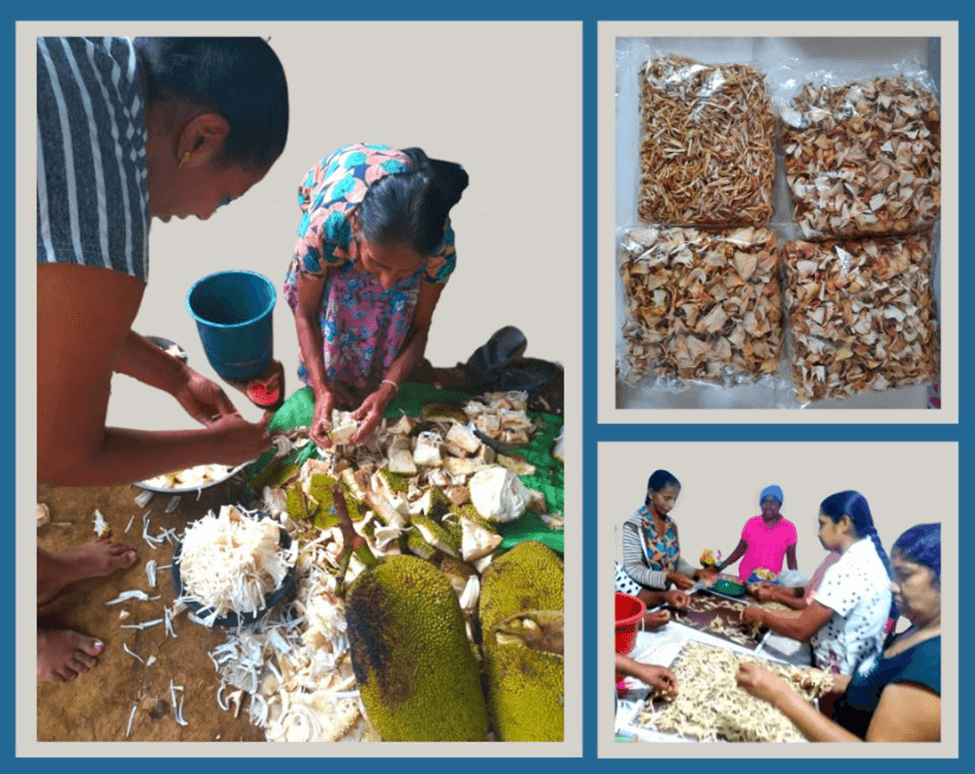
Hands-on training for fifteen women from the village of Wabadda, in the Badulla district in making dehydrated jackfruit and other jackfruit related products such as dried jackfruit seeds and jackfruit seed shells © Renaissance Sri Lanka
Project 350: Dry food industry
Linked to Project 100, Renaissance Sri Lanka and its partner, Women’s Development Center (WDC) of Badulla Sri Lanka, are conducting a major project that will empower 50 women directly and 350 women over five years indirectly, in one of Sri Lanka’s poorest districts, Badulla. Badulla District is an administrative district of Uva Province in Sri Lanka, with an area of 2,861 km2. Its capital is Badulla, located southeast of Kandy, on the Badulu Oya River. According to the Sri Lanka National Multidimensional Poverty Index (NMPI), more than one third of Badulla’s population lives in poverty. It is the second poorest district from Sri Lanka, just after Nuwara-Eliya.
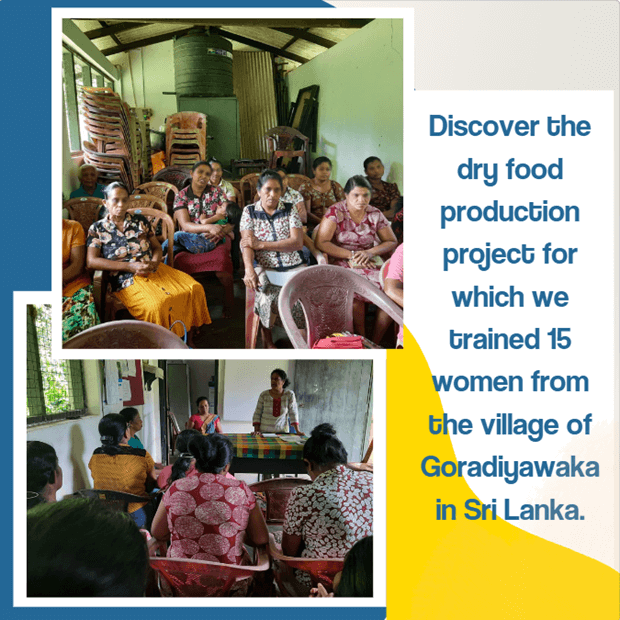
The awareness-raising program to reunite the 15 women of the Goradiyawaka village group in the Walikemulla grama niladari division of the Badulla district in Sri Lanka, and to introduce the fruit and vegetable dehydration project © Renaissance Sri Lanka
It aims to improve the incomes of these families through conservation of food and the sale of local agricultural products, by maximizing the use of seasonal products to reduce waste and provide income for families throughout the year and optimizing the production and conservation of local products grown by families. Training will be provided on building cooperatives, allowing families to draw a regular income throughout the year with the sale of their local products. By improving the production and sales capacities of these women and their economic roles and incomes, it will increase their decision-making powers in the private sector. The project commenced in January 2023 and will be complete in April 2024.
See article in link for further details.
Project 120: Agro Ecological Farming
Sri Lanka is weakened by an agricultural crisis that began decades ago, due to the implementation of an agricultural system that relies heavily on expensive and scarce imported inputs, but also harms the environment and the population.
The economic crisis that began in early 2022 has profoundly compromised Sri Lanka’s ability to feed its own population. Traditional agriculture, also known as indigenous agriculture, was practiced under the direction of women. RSL aims to revive this tradition, by training 120 women from vulnerable communities in the northern provinces in organic farming through agro-ecological practices to ensure a stable income.
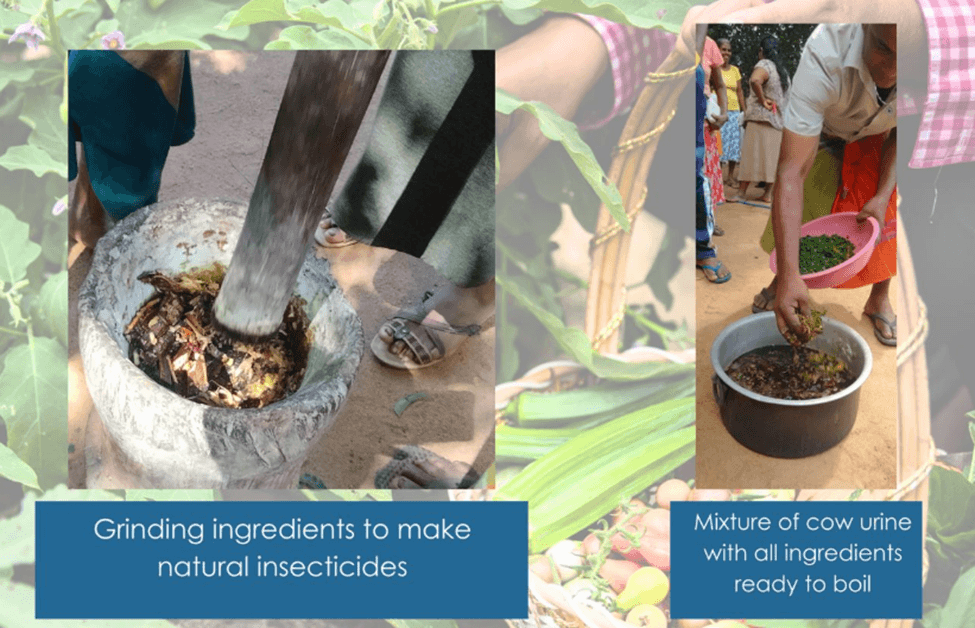
Making homemade insecticide by group of 38 people in Polonnaruwa © Renaissance Sri Lanka
The project focuses on three groups of women:
1. Women victims of microfinance scams: 2.5 million women have been affected by microfinance scandals operated by unregistered microfinance agencies and individual lenders. Many of these women are from farming communities and are subject to threats and sexual harassment by loan collectors and sued for defaulting the loans and payments.
2. Women who have resettled due to the construction of the Yan-oya reservoir: this project has impacted 500 families that had to resettle. Most of these families depend on agriculture and are now facing problems earning a decent income, due to lack of infrastructure and resources for agriculture.
3. Women affected by the Lower Malwathu Oya reservoir project: over 650 farming families are impacted in all.
Renaissance Sri Lanka are empowering women, increasing Sri Lanka’s agricultural production of staple foods and improving food sovereignty and security.
RSL implemented this project together with MONLAR in August 2022 and is now successfully completed.
See article in link for further details.
Events
Agro-ecological Webinar Series
In April 2021, Sri Lanka banned the import of agrochemicals with the goal of making all agricultural production in the country organic. Within months of the ban, the country began to face a food crisis as farmers were not prepared to transform their farming techniques and resources to organic methods overnight.
Renaissance Sri Lanka collaborated with MONLAR (Movement of Land and Agricultural Reform) and to produce educational webinars, highlighting the importance of agro-ecology. The webinar attracted over three hundred attendees.
Awards
Renaissance Sri Lanka was awarded at the 20th anniversary gala of PRA OSIM organized by FORIM – réseau des diasporas solidaires, a French organization, in December 2022, for the project of operating community dry food businesses in Sri Lanka.
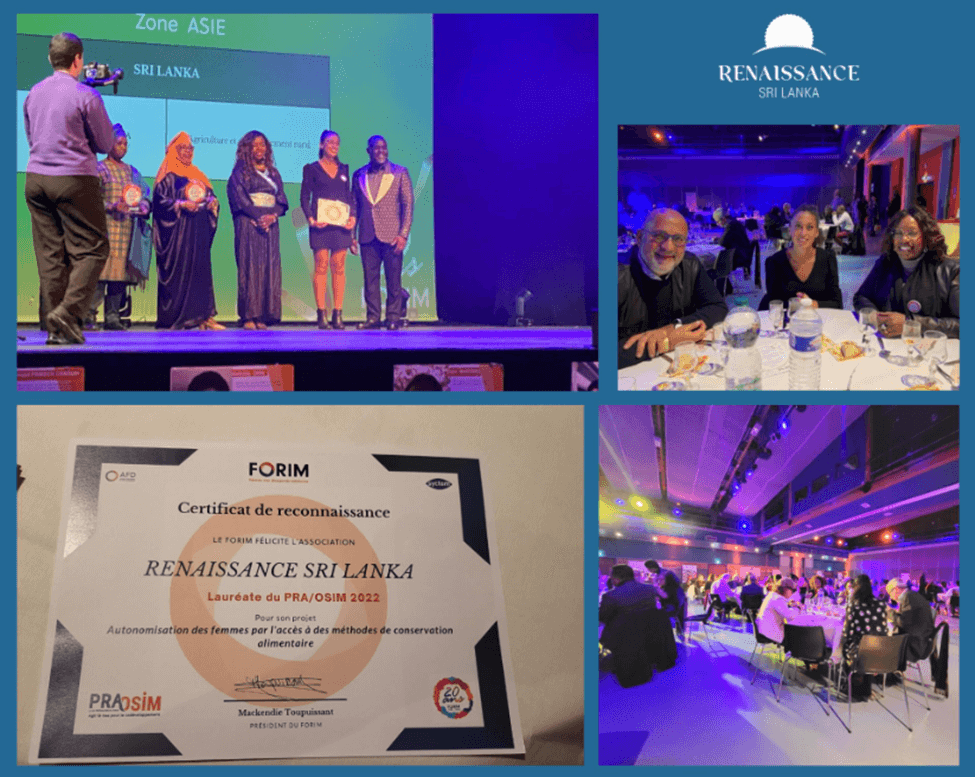
Renaissance Sri Lanka Honored at 20th Anniversary Gala of PRA OSIM by FORIM © Renaissance Sri Lanka
Press
EcoRéseau – France – June 2021
The Sunday Times – Sri Lanka – October 2021
The Australian Information Industry Association (AIIA) – Connector Magazine – November 2022
Sponsors
Humanitarian Partners
Rainforest Protectors of Sri Lanka
Praja
Monlar
Greenfem
Savisthri
Trinco Creation
Playhouse
Janakaraliya
Women’s Development Centre [WDC]
Women’s Resource Centre
References
5 Exporters, importers shift Rs 13.2 trillion overseas via dodgy invoicing
8 Brain Tea documentary on Feminist Struggles in Sri Lanka.
10 Project 1000
13 Project 100
14 Project 350
16 Sri Lanka National Multidimensional Poverty Index (NMPI)
17 Project 120
18 Sri Lankan Economic Crisis 2019-Present
29 Building a Sri Lankan Organic Farming Model
Author
Chathurika Hemachandra
